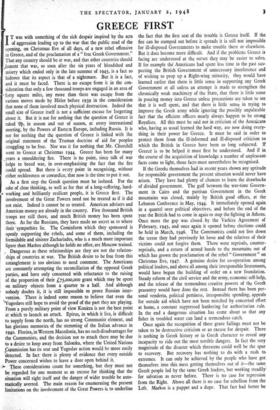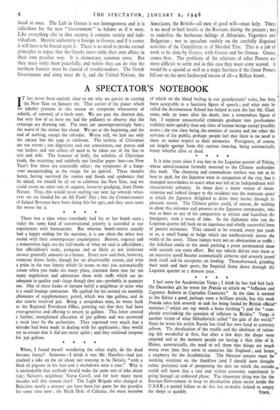GREECE FIRST
y T was with something of the sick despair inspired by the acts I of aggression leading up to the war that the public read of the opening, on Christmas Eve of all days, of a new rebel offensive in Greece, and of the proclamation of a " free Greek Government." That any country should be at war, and that other countries should ,foment that war, so soon after the six years of bloodshed and misery which ended only in the late summer of 1945, is a fact so hideous that its aspect is that of a nightmare. But it is a fact, and it must be faced. There is no escape from it in the con- sideration that only a few thousand troops are engaged in an area of forty square miles, any more than there was escape from the various moves made by Hitler before 1939 in the consideration that none of them involved much physical destruction. Indeed the small size of Greece itself is not, a sufficient excuse for forgetting about it. But it is not for nothing that the question of Greece is raked in season and out of season, at every international meeting, by the Powers of Eastern Europe, including Russia. It is not for nothing that the question of Greece is linked with the original statement of the Truman doctrine of aid for peoples struggling to be free. Nor was it for nothing that Mr. Churchill went to Greece at Christmas 1944. Greece has been for many years a smouldering fire. There is no point, since talk of war helps to breed war, in over-emphasising the fact that the fire could spread. But there is every point in recognising, without either recklessness or cowardice, that now is the time to put it out.
As a first step the Greek question must be isolated. For the sake of clear thinking, as well as for that of a long-suffering, hard- working and brilliantly resilient people, it is Greece first. The involvement of the Great Powers need not be treated as if it did not exist. Indeed it cannot be so treated. American advisers and American money are already in the country. Five thousand British troops are still there, and much British money has been spent there. As for the Russians, they have made no secret as to where their -sympathies lie. The Cominform which they sponsored is openly supporting the rebels, and some of them, including the formidable and sinister Zachariades, who is a much more important figure than Markos although he holds no office, are Moscow trained.
Dangerous as these relationships are they are not the relation- ships of countries at war. The British desire to be free from this entanglement is too obvious to need comment. The Americans are constantly attempting the reconciliation of the opposed Greek parties, and have only consented with reluctance to the raising of the proportion of their £75,000,000 grant which may be spent on military objects from a quarter to a half. And although nobody doubts it, it is still impossible to prove Russian inter- , vention. There is indeed some reason to believe that even the 'Yugoslays still hope to avoid the proof of the part they are playing. From a purely military point of view Konitza is not the best point at which to launch an attack. Epirus, in which it lies, is difficult to supply from the north, has no strong Communist element, and has glorious memories of the stemming of the Italian advance in 1940. Florina, in Western Macedonia, has no such disadvantages for the Communists, and the decision not to attack there may be due to a desire to keep away from Salonika, where the United Nations ,Commission has its seat and Yugoslav action would be more easily detected. In fact there is plenty of evidence that every outside Power concerned wishes to leave a door open behind it.
0.• These considerations count for something, but they must not be regarded for one moment as an excuse for thinking that the situation will right itself and the danger of wider trouble be auto- matically averted. The main reason for enumerating the present limitations on the involvement of the Great Powers is to underline the fact that the first seat of the trouble is Greece itself. If the fire can be stamped out before it spreads it is still not impossible for ill-disposed Governments to make trouble there or elsewhere. But it does become more difficult. And if the problems Greece is facing ate understood at the outset they may be easier to solve. If for example the Americans had spent less time in the past sus- pecting the British Government of unnecessary interference and of wishing to prop up a Right-wing minority, they would have learned earlier that there is little sense in supporting any Greek Government at all unless an attempt is made to strengthen the chronically weak machinery of the State, that there is little sense in pouring money into Greece unless precautions are taken to see that it is well spent, and that there is little sense in trying to improve the Greek army while ignoring the possibly unpalatable fact that the efficient officers nearly always happen to be strong Royalists. All this must be said not in criticism of the Americans who, having as usual learned the hard way, are now doing every- thing in their power for Greece. It must be said in order to protect them from the ill-informed and ill-disposed criticism to which the British in Greece have been so long subjected. If Greece is to be helped it must first be understood. And if in the course of the acquisition of knowledge a number of unpleasant- facts come to light, those facts must nevertheless be recognised.
If the Greeks themselves had in recent years shown any aptitude for responsible government the present situation would never have arisen. They have had plenty of chances to learn the drawbacks of divided government. The gulf between the war-time Govern- ment in Cairo and the partisan Government in the Greek mountains was closed, mainly by British good offices, at the Lebanon Conference in May, 1944. It immediately opened again in a quarrel over political objectives, and before the end of the year the British had to come in again to stop the fighting in Athens.
Once more the gap was closed- by the Varkiza Agreement of February, 1945, and once again it opened before elections could be held in March, 1946. The Communists could not live down the terror they had previously let loose and the relatives of their victims could not forgive them. There were reprisals, counter- reprisals, and a return of armed bands to the mountains out of which has grown the proclamation of the rebel " Government " on Christmas Eve, 1947. A genuine desire for co-operation among political leaders, and above all among their irresponsible lieutenants, would have begun the building of order on a new foundation. Steady reform of the civil service and the army, economic self-help, and the release of the tremendous creative powers of the Greek peasantry would have done the rest. Instead there has been per- sonal vendetta, political pettiness, irresponsible spending, appeals for outside aid which have not been matched by concerted effort at home, a constant suppressed hankering for authoritarian rule. In the end a dangerous situation has come about so that any fisher in troubled water can land a tremendous catch.
Once again the recognition of these grave failings must not be taken to be destructive criticism or an excuse for despair. There is nothing in Greek history or in Greek character to reveal any incapacity to ride out the most terrible dangers. In fact the very magnitude of the disaster which threatens could well be the spur to recovery. But recovery has nothing to do with a rush to extremes. It can only be achieved by the people who have got themselves into this mess getting themselves out of it—the same, Greek people led by the same Greek leaders, but working steadily for salvation as never before. There is no case for repression from the Right. Above all there is no case for rebellion from the Left. Markos is a puppet and a dupe. That fact had better be faced at once. The Left in Greece is not homogeneous and it is ridiculous for the new " Government " to behave as if it were. Like everything else in that country it contains variety and indi- vidualism. Marxist uniformity is foreign to Greece, and if it comes it will have to be forced upon it. There is no need to invoke eternal principles to argue that the Greeks must settle their own affairs in their own peculiar way. It is elementary common sense. But they must settle them peacefully, and before they can do that the northern frontier must be cleared of trouble-makers. The Greek Government and army must do it, and the United Nations, the Americans, the British—all men of good will—must help. There is no need to hurl insults at the Russians during the process ; nor, to underline the barbarous failings of Albanians, Yugoslays and' Bulgarians ; nor to speculate unduly on the carefully disguised activities of the Cominform or of Marshal Tito. This is a job of work to be done by Greece, with Greece and for Greece. Greece comes first. The problems of the relations of other Powers are more difficult to settle and in this case they must come second. It would be a squalid as well as a tragic business if the Great Powers fell out on the most hackneyed excuse of all—a Balkan brawl.







































 Previous page
Previous page